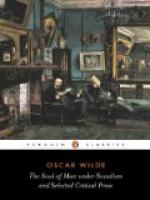importance were set forth. The public were really
very indignant. They lost their temper.
They said silly things. No one minded.
No one was a whit the worse. No one accepted
the authority of public opinion. And now it
is almost impossible to enter any modern house without
seeing some recognition of good taste, some recognition
of the value of lovely surroundings, some sign of
appreciation of beauty. In fact, people’s
houses are, as a rule, quite charming nowadays.
People have been to a very great extent civilised.
It is only fair to state, however, that the extraordinary
success of the revolution in house-decoration and
furniture and the like has not really been due to
the majority of the public developing a very fine taste
in such matters. It has been chiefly due to
the fact that the craftsmen of things so appreciated
the pleasure of making what was beautiful, and woke
to such a vivid consciousness of the hideousness and
vulgarity of what the public had previously wanted,
that they simply starved the public out. It would
be quite impossible at the present moment to furnish
a room as rooms were furnished a few years ago, without
going for everything to an auction of second-hand
furniture from some third-rate lodging-house.
The things are no longer made. However they
may object to it, people must nowadays have something
charming in their surroundings. Fortunately
for them, their assumption of authority in these art-matters
came to entire grief.
It is evident, then, that all authority in such things
is bad. People sometimes inquire what form of
government is most suitable for an artist to live
under. To this question there is only one answer.
The form of government that is most suitable to the
artist is no government at all. Authority over
him and his art is ridiculous. It has been stated
that under despotisms artists have produced lovely
work. This is not quite so. Artists have
visited despots, not as subjects to be tyrannised
over, but as wandering wonder-makers, as fascinating
vagrant personalities, to be entertained and charmed
and suffered to be at peace, and allowed to create.
There is this to be said in favour of the despot,
that he, being an individual, may have culture, while
the mob, being a monster, has none. One who
is an Emperor and King may stoop down to pick up a
brush for a painter, but when the democracy stoops
down it is merely to throw mud. And yet the democracy
have not so far to stoop as the emperor. In
fact, when they want to throw mud they have not to
stoop at all. But there is no necessity to separate
the monarch from the mob; all authority is equally
bad.




